Vietnam’s defense minister traveled to China last week to meet with the vice chairman of China’s Central Military Commission, and the two countries signed a series of bilateral economic agreements later in the week. In an email interview, Brantly Womack, a professor of politics at the University of Virginia and author of “China and Vietnam: The Politics of Asymmetry,” discussed China-Vietnam relations. WPR: What is the current state of China-Vietnam relations? Brantly Womack: In the past 50 years China and Vietnam have been both bosom buddies and implacable enemies, which would suggest that the relationship is unstable. But China has […]
Defense & Security Archive
Free Newsletter
The Libyan intervention is now reaching an inflection point, with the limited initial commitment of force apparently incapable of achieving the expressed — and universally desired — strategic outcome of driving Moammar Gadhafi from power. As a result, Britain and France will send small teams of military advisers in an effort to improve the rebels’ fighting capability, and the U.S. has decided to commit UAV drones to the intervention. But neither measure is likely to have a rapidly decisive impact on the fighting, which has now devolved into a war of attrition that neither side seems poised to win, which […]
The head of India’s navy, Adm. Nirmal Verma, recently met with senior military and civilian officials in Bangladesh, including Prime Minister Sheikh Hasina and President Mohammed Zillur. In an email interview, Sreeradha Datta, a research fellow at the Institute for Defense Studies and Analysis in New Delhi, discussed India-Bangladesh relations. WPR: What is the recent history of India-Bangladesh relations? Sreeradha Datta: Although they began as friends following Bangladesh’s independence, India and Bangladesh quickly lapsed into indifferent if not hostile and antagonistic relations. The worst phase in bilateral ties occurred from 2001-2006. The two subsequently emerged again as friendly and supportive […]
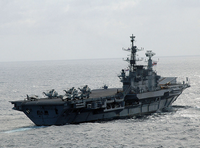
The plight of the Indian freighter MV Asphalt Venture has added a new dimension to India’s fight against piracy in the Indian Ocean. In a first, a spokesperson for pirates based in Harardhere, Somalia, announced last week that they had reached a “consensus” decision to retain seven Indian sailors as hostages — even though the pirates had released the ship itself after receiving the full ransom from its Mumbai-based owners. The move is an attempt to achieve the release of about 120 Somali pirates currently held in Indian prisons following a series of Indian naval actions in the Indian Ocean […]
The wave of violence gripping Iraq intensified Monday when a double suicide car bombing killed at least six people and wounded 20 outside the heavily fortified entrance of Baghdad’s Green Zone. The bombings — likely carried out by Sunni groups linked to al-Qaida — could allow Iraqi Prime Minister Nouri al-Maliki to strengthen his hold on power, says J. Edward Conway, a World Politics Review contributor and former U.S. Defense Department analyst covering Iraq. “With the ongoing attacks, he’s basically allowed to play the security card,” Conway told Trend Lines this morning. “Some are worried that al-Maliki is acting more […]
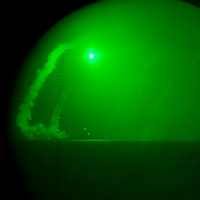
The NATO campaign in Libya has just begun its second month, and the situation on the ground is not improving. The defenses of Misurata are deteriorating, and rebel forces appear to be falling back from Adjadibya. In spite of the deteriorating tactical situation, however, the leaders of France, the United Kingdom and the United States have formulated in very certain terms the maximalist strategic goals of the campaign: the end of Moammar Gadhafi’s grip on power. The basic problem remains one of complete incoherence between strategic goals and operational means. Paris, London and Washington want Gadhafi gone. However, none of […]
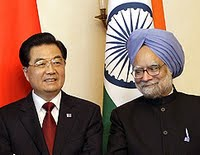
The signals emanating from the mini-summit between Indian Prime Minister Manmohan Singh and Chinese President Hu Jintao, held on the sidelines of the recently concluded BRICS conference in Hainan, China, were largely positive. The leaders both showed an interest in arresting the downward slide in bilateral relations that had lately touched a low. Ties between the two Asian neighbors have been bedeviled by the infiltration of Chinese soldiers into Arunachal Pradesh, China’s intrusion into some areas of Pakistan-occupied Kashmir and Beijing’s issuance of stapled visas to residents of Jammu and Kashmir entering China. Piqued by these developments, India had suspended […]

In June 2009, a computer worm called Stuxnet was unleashed against the nuclear enrichment plant at Natanz, Iran. Designed to infect the operating system used by the Iranians to control their nuclear centrifuges, Stuxnet significantly disrupted, and thus delayed, Iranian nuclear efforts, according to a New York Times report on Jan. 15, 2011. The Times report also provided a breathtaking peek behind the scenes of what appears to have been a large and complex covert operation to develop the Stuxnet worm. If the revelations are true, then the Stuxnet attack provides significant insights about the potential character of war by […]
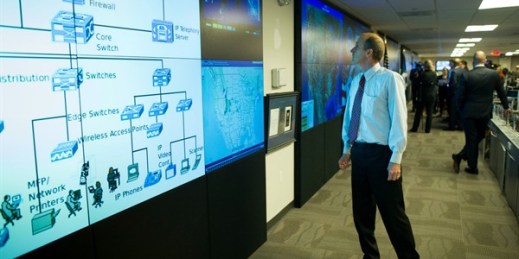
Editor’s note: The following article is one of 30 that we’ve selected from our archives to celebrate World Politics Review’s 15th anniversary. You can find the full collection here. Cyberspace has long been seen as shifting power toward the individual, with attacks over the past decade on corporations, governments and other weighty institutions largely corroborating this view. But while the structure of cyberspace itself will always lend significant and previously unavailable advantages to individuals, we are now entering a period where governments and institutions are beginning to regain the upper hand against asymmetric cyberwarfare. In his 1996 "Declaration of the Independence […]

The cables were cut multiple times, despite being buried beneath the Mediterranean seabed, five miles off the Egyptian coast, near Alexandria. As a result, Internet finance and commercial traffic stalled in at least 10 Middle Eastern and Asian countries in early 2008. More than 80 million Web users in India, Pakistan, Egypt and Saudi Arabia had connection problems. Egypt and Pakistan alone lost 70 percent of their digital connections to the outside world. “It even affected [U.S. Central Command],” said James Lewis, director of the technology and public policy program at the Center for Strategic and International Studies (CSIS), a […]
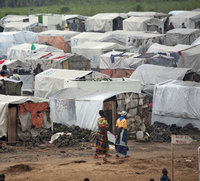
The World Bank’s 2011 World Development Report is out, and this year’s version highlights the interplay between “conflict, security, and development.” That’s a welcome theme to someone who’s spent the last decade describing how globalization’s spreading connectivity and rules have rendered certain regions stable, while their absence has condemned others to perpetual strife. But although the growing international awareness of these crosscutting issues is long overdue, the report ultimately disappoints by focusing only on the available tools with which great powers might collaborate on these stubborn problems, while ignoring the motivations that prevent them from doing so. First, the good […]
The uprising against the 41-year rule of Libyan leader Moammar Gadhafi began peacefully. But when government troops used force to suppress the demonstrations, they escalated into what increasingly looks like a civil war. Opposition forces, based mostly in the east, are fighting the much better-equipped and better-trained Gadhafi troops. But their leaders are trying to change that.

The Obama administration’s reluctant involvement in the Libya operation recalls the Biblical adage, “One man sows, another reaps.” The United States agreed to undertake the heavy lifting needed to get the air campaign started, in particular handling the precision strikes to disable Moammar Gadhafi’s air defenses, suppress some of his heavy weapon capabilities and target the very centers of his regime’s power in Tripoli. But the understanding was that responsibility would subsequently be transferred onto the shoulders of others: the Libyan rebels, our NATO allies and other partners. In every speech and statement, President Barack Obama was quite clear that […]
Calls by demonstrators for greater political freedoms are getting louder in Damascus and, according to reports from Aleppo, Syria’s second city, one hundred anti-government protesters have demonstrated at the main university there. Three students have been arrested in what is thought to be the city’s first demonstration during the recent wave of unrest.
The world’s emerging economic giants have called for a reform of the global financial system at their annual summit. According to this report by the Russian government-owned global news station Russia Today, the so-called BRICS nations — Brazil, Russia, India, China and South Africa — have also commented on NATO’s operation in conflict-torn LIbya.
